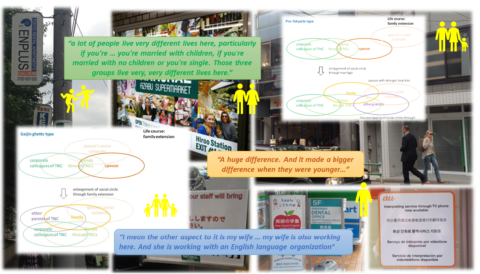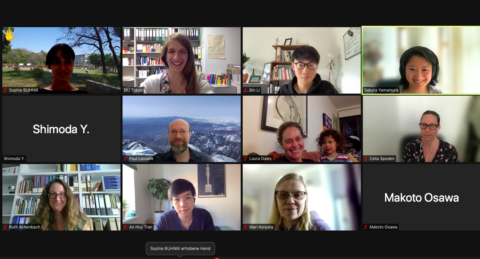
Download
Veranstaltungsort
Online (Zoom)
Anmeldung
This is a past event. Registration is no longer possible.
Please subscribe to our DIJ Newsletter to stay informed about our research activities, events, and publications:
Mobile professionals and their families: The making of transnational spaces in Tokyo from a male perspective
7. September 2021
Sakura Yamamura, Max Planck Institute for the Study of Religious and Ethnic Diversity

Conceiving mobile corporate professionals as part of the growing transnational migrant population is a rather novel turn in migration research. Likewise, research on their families – including their trailing spouses and third culture kids – is an emerging field. Based on interviews with 43 male transnational corporate professionals in Tokyo, this lecture paper presented their take on the effects that their marrying and starting a family had on their socio-spatial patterns within the urban space. Whereas transnational professionals have been mostly researched in their functions and practices as economic actors, this study gave a new insight into their social and socio-spatial lives from a personal and thus individual migrant’s perspective. Though relatively uncommon to take the masculine view on family and gender issues, the narratives of the working fathers and husbands still constitute a non-negligible piece of the overall picture of transnational families. Touching also upon issues of different patterns of binational/-cultural marriages, the speaker discussed how the extent and quality of transnational spaces transform over the life course.
Following Yamamura’s presentation, the participants discussed her methodology, the term „gaijin ghetto“, the constitution of gendered spaces („motherly spaces“), and the impact of the pandemic on highly mobile families.
Sakura Yamamura (PhD) is a postdoctoral researcher at the Max Planck Institute for the Study of Religious and Ethnic Diversity. Building on her PhD research on transnational professionals’ socio-spatial patterns within the global city network but also within Tokyo, she is specialized in the spatiality of social and economic activities in migrant-led diversification of society or superdiversity in the urban context. She is the author of “Spatial Diversity in the Global City – Transnational Tokyo” (Palgrave Macmillan, forthcoming) and articles in the Journal of Ethnic and Migration Studies and the Oxford Handbook of Superdiversity.